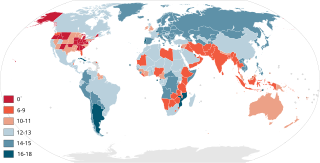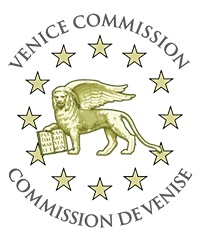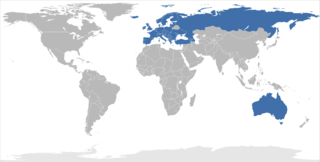Related Research Articles

The Council of Europe is an international organisation founded in the wake of World War II to uphold human rights, democracy and the rule of law in Europe. Founded in 1949, it has 46 member states, with a population of approximately 675 million; it operates with an annual budget of approximately 500 million euros.

The European Convention on Human Rights is an international convention to protect human rights and political freedoms in Europe. Drafted in 1950 by the then newly formed Council of Europe, the convention entered into force on 3 September 1953. All Council of Europe member states are party to the Convention and new members are expected to ratify the convention at the earliest opportunity.

The age of criminal responsibility is the age below which a child is deemed incapable of having committed a criminal offence. In legal terms, it is referred to as a defence/defense of infancy, which is a form of defense known as an excuse so that defendants falling within the definition of an "infant" are excluded from criminal liability for their actions, if at the relevant time, they had not reached an age of criminal responsibility. After reaching the initial age, there may be levels of responsibility dictated by age and the type of offense committed.

The American Law Institute (ALI) is a research and advocacy group of judges, lawyers, and legal scholars established in 1923 to promote the clarification and simplification of United States common law and its adaptation to changing social needs. Members of ALI include law professors, practicing attorneys, judges and other professionals in the legal industry. ALI writes documents known as "treatises", which are summaries of state common law. Many courts and legislatures look to ALI's treatises as authoritative reference material concerning many legal issues. However, some legal experts and the late Supreme Court Justice Antonin Scalia, along with some conservative commentators, have voiced concern about ALI rewriting the law as they want it to be instead of as it is.

Juvenile delinquency, also known as juvenile offending, is the act of participating in unlawful behavior as a minor or individual younger than the statutory age of majority. In the United States of America, a juvenile delinquent is a person who commits a crime and is under a specific age. Most states specify a juvenile delinquent as an individual under 18 years of age while a few states have set the maximum age slightly different. In 2021, Michigan, New York, and Vermont raised the maximum age to under 19, and Vermont law was updated again in 2022 to include individuals under the age of 20. Only three states, Georgia, Texas, and Wisconsin still appropriate the age of a juvenile delinquent as someone under the age of 17. While the maximum age in some US states has increased, Japan has lowered the juvenile delinquent age from under 20 to under 18. This change occurred on April 1, 2022 when the Japanese Diet activated a law lowering the age of minor status in the country. Just as there are differences in the maximum age of a juvenile delinquent, the minimum age for a child to be considered capable of delinquency or the age of criminal responsibility varies considerably between the states. Some states that impose a minimum age have made recent amendments to raise the minimum age, but most states remain ambiguous on the minimum age for a child to be determined a juvenile delinquent. In 2021, North Carolina changed the minimum age from 6 years old to 10 years old while Connecticut moved from 7 to 10 and New York made an adjustment from 7 to 12. In some states the minimum age depends on the seriousness of the crime committed. Juvenile delinquents or juvenile offenders commit crimes ranging from status offenses such as, truancy, violating a curfew or underage drinking and smoking to more serious offenses categorized as property crimes, violent crimes, sexual offenses, and cybercrimes.

The Committee of Ministers of the Council of Europe or Committee of Ministers is the Council of Europe's decision-making body. It comprises the Foreign Affairs Ministers of all the member states, or their permanent diplomatic representatives in Strasbourg. It is both a governmental body, where national approaches to problems facing European society can be discussed on an equal footing, as well as a collective forum, where Europe-wide responses to such challenges are formulated. In collaboration with the Parliamentary Assembly, it is the guardian of the Council's fundamental values; it monitors member states' compliance with their undertakings.

The Venice Commission, officially European Commission for Democracy through Law, is an advisory body of the Council of Europe, composed of independent experts in the field of constitutional law. It was created in 1990 after the fall of the Berlin Wall, at a time of urgent need for constitutional assistance in Central and Eastern Europe.

Lyal S. Sunga is a well-known specialist on international human rights law, international humanitarian law and international criminal law.

Ecocide is human impact on the environment causing mass destruction to that environment.
CAHDI, formally the Committee of Legal Advisers on Public International Law, is a committee of the Council of Europe.

The Siracusa International Institute for Criminal Justice and Human Rights, until 2017 Istituto Superiore Internazionale di Scienze Criminali (ISISC) is a not-for-profit organisation located in Syracuse, Italy, that was established in 1972. The organisation specializes in the design and implementation of human rights, rule of law, justice and capacity building projects throughout the world. The organisation pays particular attention to such issues that arise from situations in Arab and Muslim countries.
Laws against child sexual abuse vary by country based on the local definition of who a child is and what constitutes child sexual abuse. Most countries in the world employ some form of age of consent, with sexual contact with an underage person being criminally penalized. As the age of consent to sexual behaviour varies from country to country, so too do definitions of child sexual abuse. An adult's sexual intercourse with a minor below the legal age of consent may sometimes be referred to as statutory rape, based on the principle that any apparent consent by a minor could not be considered legal consent.
Rodney Emrys Morgan is Professor Emeritus, University of Bristol and Visiting Professor at the University of Sussex. He is the former chair of the Youth Justice Board for England and Wales (2004-7) and prior to that was HM Chief Inspector of Probation for England and Wales (2001-4).
Victims' rights are legal rights afforded to victims of crime. These may include the right to restitution, the right to a victims' advocate, the right not to be excluded from criminal justice proceedings, and the right to speak at criminal justice proceedings.

Nestor Courakis is Emeritus Professor of Criminology and Penology at the National and Kapodistrian University of Athens, Faculty of Law and a full-time Professor at the University of Nicosia.

The Convention on Laundering, Search, Seizure and Confiscation of the Proceeds from Crime, also known as the Strasbourg Convention or CETS 141, is a Council of Europe convention which aims to facilitate international co-operation and mutual assistance in investigating crime and tracking down, seizing and confiscating the proceeds thereof. The Convention is intended to assist States in attaining a similar degree of efficiency even in the absence of full legislative harmony.
The Canadian Criminal Justice Association (CCJA) is a national, voluntary organization founded in 1919, dedicated to improving Canada's justice system. Its office is in Ottawa.

The Commission on Crime Prevention and Criminal Justice (CCPCJ) a functional commission of the United Nations Economic and Social Council (ECOSOC) based in Vienna. The commission serves as the primary organ that guides the activities of the United Nations in the fields of crime prevention and criminal justice.
Cicely Musgrave Craven was a British educator, magistrate, and prison reformer.

Sylvi Inkeri Anttila was a Finnish jurist and criminologist who was the Minister of Justice of Finland during the caretaker government of Keijo Liinamaa in 1975. She studied criminal law at the University of Helsinki, becoming the first woman in Finland to receive a doctorate in law in 1946 and the first female professor of criminal law in Finland in 1961.
References
- ↑ "Conference of European Ministers of Justice". www.coe.int. Archived from the original on 2006-10-23.
- ↑ http://www.coe.int/t/e/legal_affairs/legal_co-operation/steering_committees/CDCJ/ [ bare URL ]
- ↑ http://www.coe.int/T/E/Legal_Affairs/Legal_co-operation/Steering_Committees/Cdpc/ [ bare URL ]
- ↑ "29th Council of Europe Conference of Ministers of Justice". Council of Europe. 2009. Retrieved 2009-09-25.